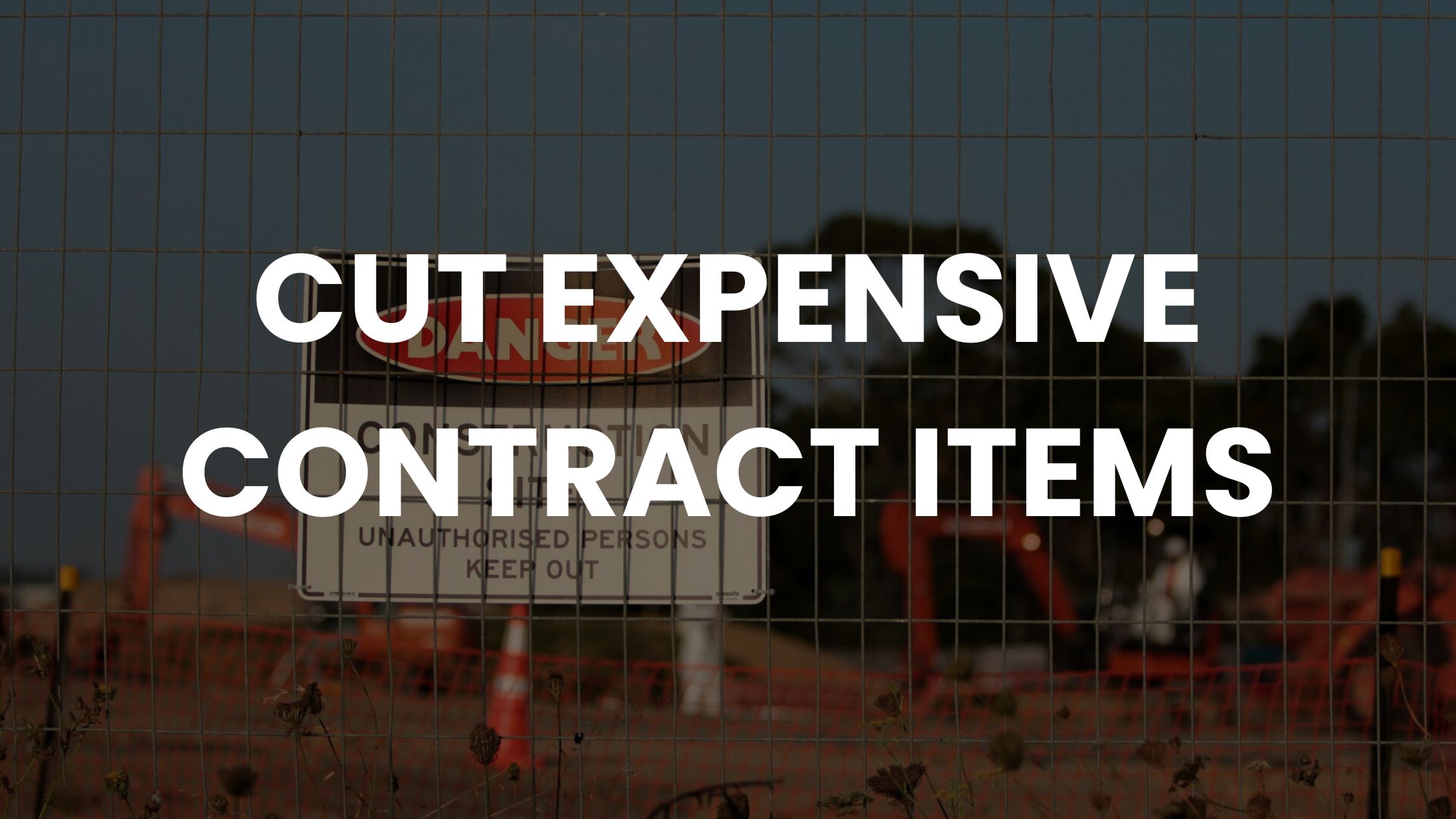How to Reduce Expensive Costs From Your New Home Contract

Discover the secrets to hassle-free
home planning and craft your
dream home with confidence,
one step at a time.
Building your dream home or even an investment property is an exciting process. Protecting your budget is key to keeping it that way, and understanding how some costs arise can help you avoid unpleasant surprises. As a former Carpenter & New Home Estimator, I want to empower you with the appropriate knowledge to get the home you envision without breaking the bank.
What Exactly are High-Margin Items?
High-margin items are a necessary part of how builders maintain profitable businesses, especially when things change after the contract is signed. When you request modifications to your new home construction contract or find essential items weren’t included, your builder needs to ensure they’re fairly compensated for the extra work that goes into supplying and installing these items.
However, some costs might seem higher than you anticipate and this is where upfront planning helps to reduce this issue.
Here are some classic examples of where expensive high-margin items can arise:
- Design Changes Mid-Build: Even small floorplan adjustments can lead to fees for redrawing, revised engineering, coordinating new materials and labour and the costs associated with supplying and installing the additional materials. This is why getting the design right BEFORE construction starts is so valuable.
- “Forgot to Include” Essentials: Items like air conditioning, wall and ceiling insulation, or basic landscaping are rarely included as standard. By being aware of these costs early on, you can budget accordingly or negotiate for their inclusion.
- Ambiguous Allowances and Upgrades: “Provisional sum items” or “Prime cost items” for things like fixtures or electrical might seem low in the contract, to make the build price more attractive. Be sure to inquire about and lock in realistic costs for your preferred finishes so you can budget or negotiate for upgrades upfront.
- Unforeseen Site Costs: While some surprises are inevitable, detailed site surveys and clear contract clauses on how things like rock excavation, retaining walls, piers and footings or poor soil conditions will be handled can minimise the risk of financial shock.
Now, the reason why these costs might seem higher than you think they should be is because the construction industry is a challenging field to operate within. With continuously rising costs and the unfortunate reality of builder insolvencies, it’s understandable that builders need to protect their bottom line.
When variations and additions arise, the charges aren’t just about the material itself, but the cascade of costs associated with keeping the entire project running smoothly – administration, estimation, revised drawings, managing trades, and ensuring quality.
Thinking about building a new home soon and not sure where to start?
Drop us an enquiry below with a few details about your goals and we’ll be in touch.
Protect Your Budget: Strategies to Employ
Above, I’ve explained to you what high-margin items look like and why they’re a necessary evil for the builder to continue operating their business. Next, I wanted to provide some insights into how you can use this information to your advantage and position yourself to avoid these expensive high-margin items within your construction contract.
To achieve this, we effectively need to make the new home quote and contract as comprehensive as possible BEFORE you sign a contract with your new home builder. This is because any items that have been overlooked or forgotten about end up landing on post-contract variations which incur that expensive high-margin pricing I’ve been talking about.
If you were to provide your builder with a comprehensive summary of everything you want included in your new home from the commencement of your relationship, how many post-contract variations do you think you’re going to need?
This effectively summarises how it works:
- Minimum preparation = More costly post-contract variations
- Medium preparation = Some costly post-contract variations
- Extensively prepared = Fewer costly post-contract variations
You might not have considered this, but builders actually love it when you’ve taken the time to think about your new home comprehensively. This allows you to convey to them what kind of home you are trying to build and all the inclusions you want within it. When you’re prepared, a second-order effect is that you’re helping your builder stay on track and deliver the home you want with minimal changes to your contract. This effectively prevents the builder’s entire team from being derailed and allows them to continue focusing on other things they were working on.
With this in mind, below are some of the ways that we can better prepare ourselves for our home planning and construction journeys:
- Do Your Homework: Don’t choose a builder based on price alone. Compare reviews, reach out to previous clients on social media, and inquire about their approach to variations and cost changes.
- Hone your vision: Work with a structured home planning service to help consolidate your vision so it’s easily interpreted and documented within your new home contract. This is our specialty 😉
- Simplify Your Design: Reducing complexity in your home design can help protect your budget. Intricate features like cantilevers require additional engineering and materials to provide structural integrity. Similarly, high-end finishes such as feature stone or polished plaster involve specialist tradespeople, adding to the cost of your new home. Opting for simpler designs and finishes can lead to significant savings.
- Negotiate Like a Pro: Once you’ve got everything on the table you can put the pressure on your builder to offer some form of discount. As an ex-estimator, I’ve seen where builders are willing to budge and it’s always before you’ve signed a contract!
- Preemptive Sourcing: Think you can find top-quality appliances, fixtures, or materials for less than the builder offers? Propose them during negotiation.
- Leverage Your Network: Know a skilled tiler, sparky, plumber, or mate with an excavator who’s willing to work for a great price? Discuss this with your builder BEFORE signing the contract. You might save a buck or two if you can get your buddy to help for mates rates.
The Right Builder Makes the Difference
What good is a great recipe without someone who knows how to prepare and cook a meal?
This adage rings true in the construction world as well. If you’ve taken all this time to prepare yourself for your builder but then come to find that your builder lacks detail in their processes and are kind of just winging it as they go, you’re going to have a bad time.
This is why it’s important to look past a builder’s shiny marketing veil (as discussed in our Sunshine Coast Builders article) and seek out insights relating to the builders ability to provide and articulate detail relating to the homes they are building.
Some questions you could ask your builder before you commence the quoting process might be:
- How do you prepare your contracts and quotes?
- Can you show me an example contract that was presented to another client?
- What level of detail can I expect in your quotes, contract, and plans?
- Do you allow changes or variations to the contract once it’s signed? if so, are there limitations and how do you handle these changes?
- Do you charge admin fees on post-contract quotes and variations?
- Can you provide examples of how you’ve resolved unforeseen issues in past projects?
- How do you ensure all my requirements are included in the contract?
- What is your process for updating me on the progress of the construction?
- Will I have a dedicated point of contact throughout the construction of my home who I can call any time?
- How do you handle delays or disruptions to the construction schedule?
- Can you explain your process for quality assurance during construction?
- How do you handle disputes or disagreements about the project?
- What warranties or guarantees do you offer on your work?
Don’t be afraid to ask some tough questions!
Decoding Builder Responses: Insights and Red Flags
What you’ll find when you begin asking these kinds of questions is that you’re likely going to get one of two responses to each question:
- You’ll get the answers to your questions with detailed explanations until you understand or;
- You’ll get some sidestepped story about how the builder is great, but this story just finds some creative way to navigate around your question.
Pay close attention to which of the two responses you’re given because this is a tell, or an insight if you will, that you can use to help decide if a builder is right for you.
Great builders are empathetic towards their clients. The way a builder responds to your questions can be a strong indicator of their professionalism and commitment to customer satisfaction. Builders who are transparent, patient, and willing to address your concerns directly are more likely to deliver a positive construction experience. They understand that building a home is a significant investment and that clear communication is key to ensuring your satisfaction with the end result.
On the other hand, builders who evade your questions or dismiss your concerns may not have your best interests at heart. This could lead to misunderstandings, unexpected costs, and dissatisfaction with the building process and your new home upon practical completion and handover.
Therefore, it’s crucial to choose a builder who is committed to transparency and customer satisfaction. This will not only ensure a smoother building process but also result in a home that meets your expectations and provides you with a sense of fulfillment and pride.
Remember, the right builder for you is one who respects your vision, values your input, and is dedicated to turning your dream home into a reality. So, don’t hesitate to ask these questions, or any others you might have, to help you make an informed decision.
The Power of Past Clients: Your Secret Weapon
Tracking down past clients of your potential builder is a smart move. It helps you uncover potential issues and either eliminate the builder from your shortlist or approach the build armed with knowledge. Think of it as your crystal ball for navigating these waters.
Here’s why seeking out past client insights is so valuable:
- Detecting Potential Pitfalls: Speaking with past clients can offer a more authentic perspective on the builder’s work. They might be more inclined to share their genuine thoughts about the builder, including any challenges they experienced that they felt uncomfortable writing about in their online reviews. This can help you uncover potential issues such as communication breakdowns, unexpected costs, or quality concerns.
- Setting Realistic Expectations: Understanding the experience that another client went through can help you anticipate what to expect during the construction process of your new home. This knowledge can prevent misunderstandings, reduce frustration, and even give you an edge during negotiations.
- Understanding the Builder’s Character: Past clients can provide insights into the builder’s personality, work ethic, values and the overall culture of their company. You might learn about their passion for their work, their problem-solving skills, or how they handle stress during challenging phases of the project. These insights can give you a more holistic view of the builder and help you determine if they are a good fit for your project.
Key Questions to Ask Past Clients
Now, let’s turn our focus to some specific questions you might ask those past clients to gain some insights into the journey they went through:
- Were you satisfied with the quality of the builder’s work?
- How well did the builder communicate throughout the construction of your new home?
- Were there any unexpected costs or delays? If so, how were they handled?
- How responsive was the builder to your concerns or requests for changes to your contract?
- Would you choose this builder again for a future project?
- If you could relive the experience what would you do differently?
- What was your overall experience with this builder?
The power of past clients cannot be underestimated. Their experiences and insights are your secret weapon in avoiding high-margin items and ensuring a smooth construction process. By asking the right questions and understanding their experiences, you can make an informed decision about your builder and enter into your construction contract with confidence and clarity.
Remember, knowledge is power, and in this case, it could also mean significant cost savings and the ability to sidestep new home builders who might otherwise provide a poor experience while building your new home.
Planning Your New Home: Why It’s Crucial Before Approaching a Builder
Embarking on the quest for the ideal home builder can be quite an endeavour. If you’re wondering how to sift through the options and identify a builder with a skilled team, efficient building processes locked down, and provided at exceptional value, you’re in good company. This is a common challenge faced by many prospective homeowners.
What many don’t realize is that once you commence discussions with a builder, typically their main aim is to get you to commit to a signed contract as quickly as possible. This rush can lead to stress and oversight, especially since it overlooks a critical aspect:
If you’d rather take a well-planned and structured approach to planning your new home, and are interested in developing a clear vision for your home before diving into conversations with a builder, then you’ve luckily come to the right place at Foresight Home Planning.
Our passion lies in helping to craft extraordinary homes. In fact, there’s nothing quite like taking a wander through a freshly completed; exceptionally designed home, so once yours is complete, don’t forget to send the invite!
At Foresight Home Planning, we’re committed to empowering you with the tools and insights needed to plan and then construct a home beyond your wildest dreams. Let’s redefine the boundaries of home design together, and help raise the standard of the homes being built across this great country by adding a dash of character and a sprinkle of innovation, ensuring each home not only reflects your unique personality and lifestyle aspirations but also invites you into the future of sustainable and intelligent living.
Through our HomeVision program and with the assistance of our IdeaDrop web app, you can shape and refine your home concept gradually until it reaches a point where you know it’s ready to come to life. With this vision, we’ll assist you in finding the ideal builder to actualize your dream home no matter where you want to build, as long as it’s confined within the boarders of Queensland as this is where we currently operate.
Our love for homes drives us at Foresight Home Planning. We’re devoted not just to ensuring you have an unforgettable experience but also to maintaining the highest standards. Witnessing the emergence of cutting-edge trends and unique designs in homes meticulously planned by their owners is our reward.
With our HomeVision program, rest assured that complete customer satisfaction is always included as standard.
Hit the learn more button below to see how we do it.
Don’t Let Your Dream Home Become a Money Pit
Building your dream home should be an exciting journey, not a financial nightmare. The key to avoiding unexpected and costly surprises is preparation and knowledge. By understanding the intricacies of construction contracts, the potential for high-margin items and ensuring you’ve captured everything you need in your new home contract, you can protect your budget from blowouts and ensure that your dream home doesn’t turn into a money pit.
A little preparation truly goes a long way. It equips you with the tools and knowledge to navigate the complex world of home construction. It allows you to ask the right questions, understand the answers, and make decisions that align with your vision and budget.
If you don’t feel like you’ve got the basics down just yet and you’re venturing into a world of unknown, take a look at our Preliminary Education program. It’s designed to get you up to speed with everything from how builders typically operate, the journey you likely have ahead, common construction industry lingo and basically just everything we think you should know if you’re thinking about building a new home in QLD.
And did I mention, the Preliminary Education stage of our HomeVision program is completely free.
By applying the strategies discussed in this article, you’ll be empowered to make informed decisions and become confident in your journey ahead. You’ll know what questions to ask a builder, when to negotiate contracts, and how to leverage the experiences of past clients. This knowledge will not only save you from potential budget overruns but also ensure that the construction process is a positive experience.
Remember, the goal is not just to build a house, but to create a home that you love, without breaking the bank. So, arm yourself with knowledge, ask the tough questions, and don’t let your dream home become a money pit.
Here’s to building your dream home with confidence and peace of mind! 🏠
**Disclaimer: The information provided in this article is based on publicly available information. While we strive to ensure the accuracy of this content, Foresight Home Planning Pty Ltd does not guarantee the completeness or reliability of the information. This article is intended for entertainment purposes only and does not constitute professional advice. Foresight Home Planning does not accept liability for any loss, expenses or damage incurred as a result of reliance on the information contained herein. Readers are advised to conduct their own research and seek professional advice before making any decisions related to property purchases, contracts with builders or investments.
*1: Terms and conditions apply. Registered users of our service must complete our HomeVision program and subsequently join our BuilderConnect program to be eligible for Foresight Home Planning to find you a builder in your local area. Please read our FAQ page for further details.

